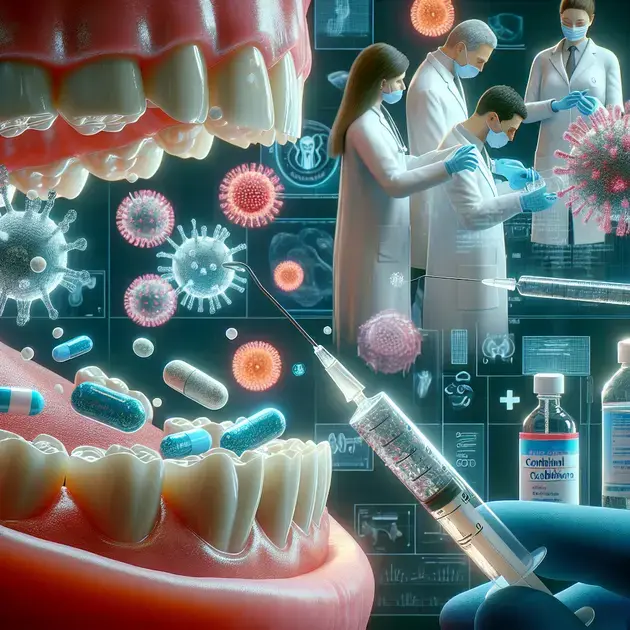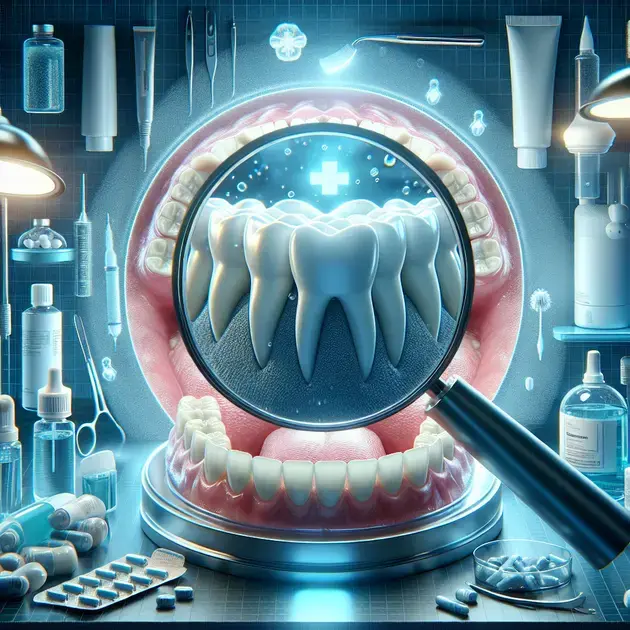When it comes to treating periodontal disease, medication for periodontitis is one of the main treatment options to consider. Periodontitis is a serious gum infection that damages the soft tissue and destroys the bone that supports your teeth. If left untreated, it can lead to tooth loss and other complications.
Fortunately, there are several types of medications available to help manage and treat periodontitis. From antibiotics to antimicrobial mouth rinses, these medications can play a crucial role in controlling the progression of the disease and improving the health of your gums. In this post, we will explore the different medication options for periodontitis and how they can benefit your oral health.

Exploring Antibiotic Treatment for Periodontitis
Periodontitis is a serious gum infection that damages the soft tissue and destroys the bone that supports your teeth. In some cases, antibiotic treatment may be recommended by your dentist to help manage the infection. To explore the options available for antibiotic treatment for periodontitis, it’s essential to consult with a dental professional who can assess your specific condition.
One common antibiotic prescribed for periodontitis is doxycycline, which helps to reduce inflammation and control the growth of bacteria. You can learn more about this antibiotic and its effectiveness in treating periodontitis by visiting the official website of the American Academy of Periodontology (perio.org).
Another antibiotic often used in the treatment of periodontitis is metronidazole. This antibiotic works by targeting specific bacteria associated with gum disease. To understand how metronidazole can benefit your periodontal health, consider reading scientific articles on the National Center for Biotechnology Information website (ncbi.nlm.nih.gov).
When considering antibiotic treatment for periodontitis, it’s crucial to follow your dentist’s instructions carefully and complete the full course of antibiotics to ensure the best possible outcome for your oral health.
The Role of Antimicrobial Mouth Rinses in Managing Periodontal Disease
Antimicrobial mouth rinses play a significant role in managing periodontal disease by reducing the levels of bacteria in the mouth and controlling gum inflammation. To effectively incorporate antimicrobial mouth rinses into your oral care routine, it’s important to choose a product that is specifically formulated to combat periodontal disease.
One popular antimicrobial mouth rinse recommended for managing periodontal disease is Listerine Antiseptic Mouthwash. You can find this product in most drugstores or order it online through websites like Amazon.com. Remember to follow the instructions on the label for the best results.
In addition to using antimicrobial mouth rinses, maintaining good oral hygiene practices such as regular brushing, flossing, and dental check-ups is essential for managing periodontal disease. Consider downloading dental care apps like Oral-B or Colgate to receive reminders and tips on proper oral care techniques.
Consult with your dentist to determine the most suitable antimicrobial mouth rinse for your specific oral health needs and incorporate it into your daily routine for improved periodontal disease management.
Combining Medications for Optimal Results
When it comes to treating periodontitis, combining medications can often lead to more optimal results in managing the condition. Your dentist may recommend a combination of antibiotics, antimicrobial mouth rinses, and other medications to effectively control gum infection and promote gum health.
To understand the potential benefits of combining medications for periodontitis treatment, it’s essential to have a detailed discussion with your dental provider. Ask about the specific medications involved, their individual roles, and how they complement each other in targeting gum disease.
Online resources such as the Mayo Clinic website (mayoclinic.org) can provide valuable information on the different medications used to treat periodontitis and how they can be combined for optimal results. Additionally, consider exploring medical apps like Epocrates or Medscape for comprehensive drug information and interactions.
By following your dentist’s recommendations and adhering to the prescribed medication regimen, you can enhance the effectiveness of treatment for periodontitis and achieve improved oral health outcomes.

Treatment Options for Periodontal Disease: Medication for Periodontitis
When it comes to treating periodontitis, medication can play a crucial role in managing the disease. Antibiotics are often prescribed to combat the bacterial infection that causes periodontitis. These medications can be taken orally or applied directly to the affected area to reduce inflammation and promote healing. Common antibiotics used for periodontitis include doxycycline, metronidazole, and minocycline.
In addition to antibiotics, antimicrobial agents such as chlorhexidine mouth rinses can also be beneficial in treating periodontitis. These mouth rinses help to reduce the levels of bacteria in the mouth, preventing further infection and promoting gum health. Regular use of antimicrobial mouth rinses can complement other treatments and help maintain oral hygiene.
It is important to follow the prescribed medication regimen carefully and adhere to your dentist’s instructions. Failure to complete the full course of antibiotics or properly use antimicrobial mouth rinses can lead to treatment failure and recurrence of periodontitis. It is also essential to maintain good oral hygiene practices, including regular brushing, flossing, and dental check-ups.
In some cases, medication for periodontitis may be used in conjunction with surgical treatments such as scaling and root planing or gum surgery. This comprehensive approach aims to target the infection from multiple angles and improve the overall health of the gums and supporting structures of the teeth.
Consult with your dentist or periodontist to discuss the best treatment options for your specific case of periodontitis. They will evaluate the severity of your condition and create a personalized treatment plan that may include medication, oral hygiene recommendations, and lifestyle changes to manage the disease effectively.
The Role of Antimicrobial Mouth Rinses in Managing Periodontal Disease
Antimicrobial mouth rinses play a crucial role in managing periodontal disease by reducing the levels of harmful bacteria in the mouth. These mouth rinses contain active ingredients such as chlorhexidine, cetylpyridinium chloride, or essential oils that target and kill bacteria, preventing the progression of gum disease.
Regular use of antimicrobial mouth rinses can help control plaque and tartar buildup, which are major contributors to periodontal disease. They can also reduce inflammation and promote healing of the gums, leading to improved oral health overall. Incorporating antimicrobial mouth rinses into your daily oral hygiene routine can complement professional dental cleanings and home care practices.
It is important to follow the instructions for use provided by the manufacturer and your dentist to achieve optimal results. Using antimicrobial mouth rinses as directed, typically twice a day after brushing and flossing, can help maintain a healthy balance of oral bacteria and prevent the recurrence of periodontal disease.
Some individuals may experience temporary discoloration of the teeth or altered taste sensation when using antimicrobial mouth rinses. These side effects are usually harmless and can be minimized by following proper usage instructions and practicing good oral hygiene habits.
Consult with your dentist or dental hygienist to determine the most suitable antimicrobial mouth rinse for your specific needs. They can recommend a product that is effective in managing periodontal disease and improving your overall oral health. Incorporating antimicrobial mouth rinses into your daily routine can be a valuable component of your periodontal disease treatment plan.
Combining Medications for Optimal Results
Combining medications for the treatment of periodontitis can enhance the effectiveness of the therapy and improve patient outcomes. By using a combination of antibiotics, antimicrobial mouth rinses, and other medications, dentists can target the bacterial infection from multiple angles and decrease the risk of treatment failure.
When combining medications, it is essential to consider the potential interactions between different drugs and any contraindications that may exist. Your dentist or healthcare provider will assess your medical history and current medications to determine the safest and most effective combination therapy for your periodontitis.
Combining antibiotics with antimicrobial mouth rinses can create a synergistic effect, enhancing the antimicrobial properties of the treatment and reducing the bacterial load in the mouth. This comprehensive approach can lead to quicker resolution of symptoms and improved healing of the gums.
Patients undergoing combined medication therapy for periodontitis should follow the prescribed regimen diligently and attend regular follow-up appointments with their dentist. Monitoring the progress of the treatment and making any necessary adjustments are essential for achieving optimal results and maintaining long-term oral health.
Discuss with your dentist the possibility of combining medications for the treatment of periodontitis. They will provide guidance on the best approach for your specific case and ensure that the combined therapy is safe and effective in managing your periodontal disease.
Conclusion
Effective management of periodontal disease, particularly periodontitis, involves a multifaceted approach that includes the strategic use of medication. Antibiotics like doxycycline, metronidazole, and minocycline are commonly prescribed to combat the bacterial infection contributing to periodontitis. When used as directed, these medications can significantly reduce inflammation and promote healing, essential for controlling the disease.
In parallel, antimicrobial mouth rinses, such as those containing chlorhexidine or essential oils, are pivotal in reducing harmful oral bacteria levels. Incorporating these rinses into daily oral hygiene routines complements professional cleanings and assists in preventing plaque and tartar buildup, major culprits in periodontal disease progression. Understanding how to use these rinses correctly is crucial for maintaining a healthy oral microbiome and preventing disease recurrence.
For optimal results, combining medications—such as antibiotics and antimicrobial rinses—can provide a synergistic effect, enhancing the overall treatment efficacy. This comprehensive approach targets the bacterial infection from various angles, leading to quicker symptom resolution and improved gum health. Following the prescribed regimen diligently is essential, as is regular follow-up with dental professionals to monitor progress and make necessary adjustments for long-term oral health maintenance.
Patients should engage in open discussions with their dentists to explore the possibility of combining medications tailored to their specific periodontitis needs. Dentists will evaluate individual cases, considering medical history and current medications to determine the safest and most effective treatment plan. Through a personalized approach encompassing medication, oral hygiene guidance, and lifestyle adjustments, periodontitis can be effectively managed, empowering patients to prioritize their oral health and overall well-being.



